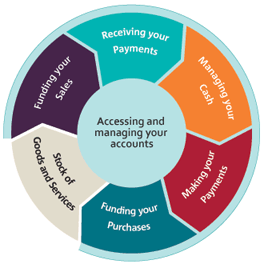Advice and tips for new start up businesses
So you're thinking of starting your own business?
Have you got what it takes to succeed?
Maybe you haven't fully formed your business idea yet but are certain you want to start your own business. Maybe you're seeking an escape from the mundane nine-to-five employment; maybe you can't stand working for anyone else for a minute longer; or perhaps you've just been made redundant or simply have an idea that's too good to go to waste. Whichever it is, that first entrepreneurial seed has been sown, and before long you will be starting your own business.
But how do you grow that seed into a thriving, new business? Firstly, do you really want to? Are you cut out for it? Even if you are, is it too greater risk to give up a secure income? And just where should you start? You've probably got at least one of these questions, along with many others, swimming around your head right now - and that's perfectly understandable.
 Starting up your own business will change your life. It'll change the way you think, the way you work, the way you spend money and the way you socialise. It'll be one of the most demanding challenges you'll ever be likely to take on.
Starting up your own business will change your life. It'll change the way you think, the way you work, the way you spend money and the way you socialise. It'll be one of the most demanding challenges you'll ever be likely to take on.
You'll work every hour possible to get your business off the ground then even longer to keep it afloat during the early days. You probably won't have another holiday for a couple of years and virtually your entire life will become focused on making your business start up succeed.
This is the harsh truth of starting your own business. If you thought you'd be reducing your hours not increasing them, that it wouldn't disrupt your family life and that, frankly, it all seems a bit too much trouble, then stop reading now; turn off your computer and think of a different way to improve your everyday happiness.
If what I've just said hasn't curbed your desire, keep reading - you're showing all the attributes an entrepreneur needs when starting up in business.
 Sure, you'll still have plenty of anxieties and unanswered questions, but like every successful entrepreneur starting a small business, the thought of a challenge excites you.
Sure, you'll still have plenty of anxieties and unanswered questions, but like every successful entrepreneur starting a small business, the thought of a challenge excites you.
If you're going to succeed, you won't mind concentrating all your energy into the new business because it'll be 'your baby' and you and your family will be the ones reaping the rewards - not a fat cat on ten times your salary. You'll also have the enthusiasm and ideas to find solutions to the obstacles in your path. And remember, you're not the first to have these anxieties or to face these obstacles as you're starting your own business.
But how do you grow that seed into a thriving, new business? Firstly, do you really want to? Are you cut out for it? Even if you are, is it too greater risk to give up a secure income? And just where should you start? You've probably got at least one of these questions, along with many others, swimming around your head right now - and that's perfectly understandable.

You'll work every hour possible to get your business off the ground then even longer to keep it afloat during the early days. You probably won't have another holiday for a couple of years and virtually your entire life will become focused on making your business start up succeed.
This is the harsh truth of starting your own business. If you thought you'd be reducing your hours not increasing them, that it wouldn't disrupt your family life and that, frankly, it all seems a bit too much trouble, then stop reading now; turn off your computer and think of a different way to improve your everyday happiness.
If what I've just said hasn't curbed your desire, keep reading - you're showing all the attributes an entrepreneur needs when starting up in business.
 Sure, you'll still have plenty of anxieties and unanswered questions, but like every successful entrepreneur starting a small business, the thought of a challenge excites you.
Sure, you'll still have plenty of anxieties and unanswered questions, but like every successful entrepreneur starting a small business, the thought of a challenge excites you.
If you're going to succeed, you won't mind concentrating all your energy into the new business because it'll be 'your baby' and you and your family will be the ones reaping the rewards - not a fat cat on ten times your salary. You'll also have the enthusiasm and ideas to find solutions to the obstacles in your path. And remember, you're not the first to have these anxieties or to face these obstacles as you're starting your own business.
How we can help you
We can help and advise you every step of the way

Every new business owner should . . . .
. . . . Get on with it! You don't have to wait until everything's perfect - perfection is highly over-rated!
'Good' is often good enough so don't hang around. Just make sure you've got these basics covered first.
Market research
Is there a market for your products or services?
 You've got a great new business idea, right? Customers are going to love it and rush to buy, right?
It might work that way if you are lucky BUT unless people are prepared to pay money for what you're offering then your new start up business will never survive. It's important that you spend time researching to make sure that there is a market for your products or services at the price you want to charge.
You've got a great new business idea, right? Customers are going to love it and rush to buy, right?
It might work that way if you are lucky BUT unless people are prepared to pay money for what you're offering then your new start up business will never survive. It's important that you spend time researching to make sure that there is a market for your products or services at the price you want to charge.
Check out your competitors
What makes you better? Why should customers choose you?
 To ensure you attract customers, you must offer something different to your competitors.
To ensure you attract customers, you must offer something different to your competitors.
- Work out who they are
- Understand what they do
- How large is their market presence
- What are their strengths & weaknesses
Developing your idea and writing a business plan
Objectives, strategies, financial forecasts

There are two different types of business plan. One is a tool to help you run your business (the working version) and the other is what you'd present to the bank or potential investors (the glossy version)
A good glossy business plan should be at least half a dozen pages long and must be well presented in a binder. Good presentation goes a long way and says a lot about you and your business. Your business plan will show your bank manager that you have thought your business through carefully and that various scenarios have been considered and that you understand the financial implications and that you have a structure or a plan of action in place.
Working business plans don't need to be long - you can probably cover it in a few paragraphs! It should describe:
- What you're offering
- How it benefits your customers
- How much it costs you to provide
- What you're going to charge for it
- How much of it you're aiming to sell
- Which customers you're targeting (don't make it too broad) and how you're going to find them
- How you're going to measure your performance including setting goals
Find a good bank
Keep your business finances seperate and organised


Ways to finance your new business
Sources of investment

Consider your finance options.
It can be hard work to secure a business loan, but your chances of success will be greatly improved if you can produce a well thought out business plan. Essentially, lenders will want to know that your company will be able to generate a decent profit within a relatively short time span; and they will usually be more amenable if the market you are targeting has a high potential for growth. You will need to produce evidence to support any profit claims, as well as demonstrating consideration for various projective scenarios.
Upfront investment
Unfortunately, many banks will be reluctant to fund the full cost of a new business enterprise. By investing some capital of your own, you will demonstrate to lenders your own commitment to the venture and increase your chances of winning them over. Choosing how much to invest can be tricky - too little and your commitment to the business seems half-hearted; too much, and you risk losing your savings. Make sure you consider this issue realistically, and seek professional advice if necessary. As well as a loan, banks can offer a facility. This is an amount of money reserved for you that you can draw from as and when you need it. It is effectively a form of a loan but you do not necessarily use it in one go. If you use a facility, you only pay interest on the money you have actually used.
 Grant schemes.
Grant schemes.A number of organisations such as the Prince's Trust, and government-backed schemes including the Enterprise Finance Guarantee scheme, offer grants and loans to people who want to start a business.
Don't underestimate Costs.
One of the most common financial traps that small business owners fall into is underestimating the cost of their start-up. It can be tempting to err on the optimistic side here, but by doing so you are only creating problems for yourself in the long run. Again, be realistic - if you have a sound business plan then it should be possible to secure the finance you really need.
Your personal finances.
Finally, don't let your preoccupation with the new business distract you from managing your personal finances. Savings can provide a bolster for potential losses, and your personal financial circumstances will be taken into account when you apply for business loans.
Ensure cash is flowing in the right direction
Sell, Sell, Sell and get paid quickly

That's IN QUICKLY so start selling from day one, if not before, and either get payment up front or on delivery. If you can't you should issue your invoices very quickly!
And OUT SLOWLY so only pay your bills when they're due and not before (but definitely not after), don't splash out on top of the range laptops or cars, consider working from home, and lease or rent equipment as you need it rather than buying.
Working from home or office?
 A lot of people choose to work from home in order to save money, but you have to be careful if you choose this option. Some people choose to start up in an office because they feel that they are more established. You feel you're in a business and it gives clients a more professional impression.
A lot of people choose to work from home in order to save money, but you have to be careful if you choose this option. Some people choose to start up in an office because they feel that they are more established. You feel you're in a business and it gives clients a more professional impression.
Working from home is fine but you're limited to some degree, for example by space. Customers sometimes perceive you as an amateur. If you take an office they give you a bit more credence. A lot of people choose to work from home to test the water, and then move into an office when they feel more confident and their client base grows. However, people who have low overheads working from home can sometimes be inclined to lower prices. They will initially make a profit but when they move into an office they will have to raise prices, which could push customers away. You have to price realistically as if you were in an office, so people aren't shocked when you put up prices.
Other considerations are would you be happy to advertise your private address and phone numbers, likewise would you mind customers turning up on your doorstep? Finally, if you work from home, you have to make sure your mortgage and insurance company are happy with it.
Getting yourself noticed
Low cost ways to market your business and raise awareness
In order to make your business a success, you must ensure that consumers know it exists. It is important to carefully consider your company's branding as that will generate a potential customer's first impression of you.
If you need a logo for your business there are lots of designers available online but remember, you get what you pay for and cheap is not always the best option.
You must research your market to find out what makes your customers buy. The more you know about them, the more you will be able to reach them. If you have a bookshop selling travel books then you need to find people going travelling, such as students, which means you have to advertise around universities.
Choosing how to advertise your company depends on what type of business it is. For example,
 If you are running a local plumbing company then delivering leaflets in your area would be the best option.
If you are running a local plumbing company then delivering leaflets in your area would be the best option.
Newspaper advertising is also a good option for local businesses. It may be worth considering running a series of adverts as opposed to a one-off, because people will notice it more.
Larger businesses such as manufacturing companies would benefit more from using brochures as opposed to leaflets. The shelf life of a brochure is generally reckoned to be about two years.
Use social media channels to create a free profile to effectively engage your potential customers such as Twitter, Facebook and Linkedin
Free business directories are also a good place to start such as Yell, Thompson Local, Free Index and Hot Frog to mention a few, the majority of directories also offer a paid service that enables you to enhance your listing and appear above the free listings in searches.
If you are advertising your business through a website you must make sure that it appears on the first couple of pages of search engine results must users will not go any further than page 3. This can be achieved through the use of a paid service such as Google Ad Words. This places relevant ads on the top and right-hand side of the search results pages. Or you could hire a professional SEO company.
You must research your market to find out what makes your customers buy. The more you know about them, the more you will be able to reach them. If you have a bookshop selling travel books then you need to find people going travelling, such as students, which means you have to advertise around universities.
Choosing how to advertise your company depends on what type of business it is. For example,

Newspaper advertising is also a good option for local businesses. It may be worth considering running a series of adverts as opposed to a one-off, because people will notice it more.
Larger businesses such as manufacturing companies would benefit more from using brochures as opposed to leaflets. The shelf life of a brochure is generally reckoned to be about two years.
Use social media channels to create a free profile to effectively engage your potential customers such as Twitter, Facebook and Linkedin
Free business directories are also a good place to start such as Yell, Thompson Local, Free Index and Hot Frog to mention a few, the majority of directories also offer a paid service that enables you to enhance your listing and appear above the free listings in searches.
If you are advertising your business through a website you must make sure that it appears on the first couple of pages of search engine results must users will not go any further than page 3. This can be achieved through the use of a paid service such as Google Ad Words. This places relevant ads on the top and right-hand side of the search results pages. Or you could hire a professional SEO company.
Essential kit to get you started

Microsoft Office software
Documentation systems are vital if you are planning to start a business. Accounting packages such as Sage or Quick Books, which can be expanded or upgraded as your business grows.
Another important purchase is a backup system. There are a number of online companies that offer backup facilities, or you can buy a remote hard drive that can be connected to your computer and where you can store copies of your files.
Finally don't try to do everything yourself.
 It takes a lot of time and effort to run a small business. You shouldn't be sitting in an office logging sales invoices or checking delivery notes when you could be out selling or doing. So stick to what you're good at and get full-time or part-time staff, freelancers, or outsource services to do the rest. You will find it very difficult to run the business as well as work in it, either one or both will suffer in the long term.
It takes a lot of time and effort to run a small business. You shouldn't be sitting in an office logging sales invoices or checking delivery notes when you could be out selling or doing. So stick to what you're good at and get full-time or part-time staff, freelancers, or outsource services to do the rest. You will find it very difficult to run the business as well as work in it, either one or both will suffer in the long term.
